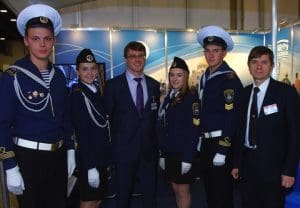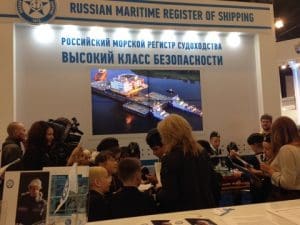
Cadets and Deputy Director of the Makarov Training Centre, Alexey Orekhov, pictured with IMO Representative (centre), Mikhail Gappoev, Technical Officer, Maritime Safety Division, celebrating IMO World Maritime Day at NEVA 2015
Improving the availability, as well as the quality, of education and training is squarely on the agenda for the entire maritime industry in 2015. The issue came to the fore on 24 September at NEVA 2015, in line with the IMO’s World Maritime Day.
A focus for the Russian industry just as it is elsewhere, as Pavel Shikhov, Chief Operating Officer, Russian Maritime Register of Shipping (RS) explains, “maritime education is of extreme importance not just in terms of bringing people into the industry but from the fundamental standpoint of ensuring safety.” He continued, “RS recognises that the proper training of seafarers and shipbuilders is core to ship safety and we, all together, need to maintain properly trained crew.”
Beyond the scope of its responsibility for certifying and auditing, on behalf of the Maritime Administration, the quality standards at 84 organisations covering federal authority, higher education, training and certification centres within the Russian Federation, RS is cooperating with a number of educational institutions to further develop the quality of maritime training available.

Cadets of the Admiral Makarov State University of Maritime and Inland Shipping pictured with Deputy Minister of Transport of Russia, V.A. Olersky, at NEVA 2015
A reciprocal agreement was signed, during NEVA 2013, with the Admiral Makarov State University of Maritime and Inland Shipping to make the best use of both the parties’ personnel and technological resources in the interest of redefining staff training in response to the brisk growth of the Russian shipbuilding industry and the associated demands for personnel and specialised skills. Highly qualified RS personnel and experts from the university participate in the educational programmes carried out by both parties at the training and simulator centres in St Petersburg and at regional branches. RS and the Makarov University are also cooperating and sharing resources in research and development work.
RS is not only dedicated to contributing to the quality of education delivered within Russia but also sees the need to raise the industry’s profile to encourage entrants to the country’s highly regarded maritime education system. To this end, on the last day at NEVA 2015, the RS stand became the venue for the children’s programme presentation “We are Living in the Maritime Capital”, developed by RS in cooperation with the Institute of Russian Literature (the Pushkin House) of the Russian Academy of Sciences, an interactive large scale model museum “Petrovskaya Akvatoria” and St. Petersburg Maritime Resource Centre for marine students of secondary schools in St. Petersburg.
Speaking with another exhibitor at NEVA 2015, the Makarov Training Centre – part of the Admiral Makarov State University of Maritime and Inland Shipping, it is clear that a maritime career at officer level is still a popular choice for young people across the Russian Federation and that the standard of training offered is very attractive to international students.

School children attending a special presentation promoting the maritime industry at the Russian Maritime Register of Shipping exhibition stand at NEVA 2015 for IMO World Maritime Day
Akim Kuzmin, 3rd year cadet studying radio engineering, described how from childhood he had wanted to follow a career in the maritime industry. The Latvian national chose to study in St Petersburg as he felt it offered the best preparation for his future career. “I really enjoy the variety of subjects and courses studied, I feel that I learn something new every day”, says Kuzmin. “It is really important to me that all the things I am learning in the classroom feel very relevant and are applicable to the working environment I will eventually enter. The Makarov University also allows me the opportunity to participate in additional courses and training that are not compulsory for my particular subject field. I have just finished a 3 month placement at sea with Transas, which was an amazing experience. I gained practical experience of the equipment onboard and this really helps to consolidate my learning and give me confidence.”
Natalia Skvortsova, a 20 year old, 4th year cadet, spoke about how she discovered the possibilities of a career in the maritime industry when representatives from the Makarov University visited her high school to promote the profession. “I found what they said so interesting and I had not thought about such a career before. After they visited my school, I researched further on the internet and also spoke to ex-pupils from my school who were already studying at the Makarov University.” Skvortsova recognised that this career choice was usually not one for girls but she says, “I felt so strongly and was really fascinated by this industry that I decided to study at the Makarov. The feedback from other pupils at the university was so good that I felt this was the right choice for me too.”
The Deputy Director of the Markarov Training Centre, Alexey Orekhov, echoed the sentiments of both Skvortsova and Kuzmin in his assertion that maritime education in Russia is both important and still a popular choice for students. He has observed that the number of recruits enrolling in maritime courses this year at the university were higher than for his generation, “This year we have 200 cadets enrolled in the Navigation department and 150 for Engineering, this is an increasing trend too it appears, ” he says.
It seems that a career in the maritime sector remains prestigious in Russia and this may be one reason helping to keep enrolment levels high. Another important factor is government support. The government funds places for cadets so their education is free, and as Orekhov points out, there have been no cuts in funding. In actual fact, the university is mid-way through completing a series of works to upgrade its infrastructure and facilities, all funded by state investment. The Training Centre however, is a commercial training centre and sees the benefit more keenly of active promotion at industry events like NEVA 2015.
The theme of the IMO World Maritime Day 2015, ‘Maritime Education and Training’, highlights the importance of the human element in underpinning the future sustainability of the industry. Outgoing IMO Secretary-General Koji Sekimizu pinpointed these areas as critical, saying: “Effective standards of training remain the bedrock of a safe and secure shipping industry, which needs to preserve the quality, practical skills and competence of qualified human resources”.
With the increasing raft of regulations, advances in technology and the impetus to perform at even higher standards with regard to safety, environmental impact and commercial sustainability the demands on those working in the sector have never been higher. As a truly global industry, shipping needs an international network of specialist education and training establishments to ensure not only a continuing stream of high-calibre entrants to the industry, but to secure that the level of skills and competencies to perform effectively is continuously maintained.
Maritime education and training must not only be of a high and consistent quality throughout the world, but broader in scope than just seafarers. Naval architecture, marine engineering, maritime law and many other fields all require specialist skills and continued professional development to ensure knowledge and competencies are kept relevant and up-to-date with the latest developments in the industry.
About NEVA 2015
NEVA 2015, The 13th International Maritime Exhibition and Conferences of Russia is held in St. Petersburg from 22-25 September 2015.
For more information, please visit: www.transtec-neva.com
|
|
|





